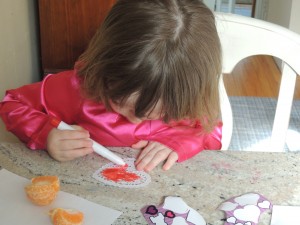Yesterday I began a conversation with George Estreich, author of The Shape of the Eye, about writing and family and Down syndrome. Today, the interview continues as George writes about medical ethics, culture, and inclusion, among other things:
When I wrote A Good and Perfect Gift, I hoped to write a book for people who have not had the experience of giving birth to a child with Down syndrome. I wanted to talk to myself before Penny was born, because I wish that person could have a chance to understand some of the things Penny has taught me to understand. Still, from what I can tell, my book has mostly been read by people with children with special needs of some sort. I was encouraged to see that People Magazine had selected your book as one of their “picks of the week,” and I hope that it will gain a wide audience that includes many who don’t have personal connections to Down syndrome. Who was your intended audience for this book and how do you convince them that it is for them?
From the beginning, I was thinking of a “general” audience—whatever that is. I understood that I had a common but unusual experience, and that a portrait from the inside might be interesting and useful.
As with A Good and Perfect Gift, I think that many of my readers—perhaps most—do have the experience of a child with Down syndrome in the family. But since the paperback came out, I think that the book has crossed over more and more. The People feature was a big part of this. I hope the book will continue to find readers of all kinds, and I do my best to get the word out.
You approach the topic of medical attitudes toward Down syndrome, particularly as you examine the language used in contemporary textbooks to describe the condition. You note that in the 2012 edition of Introduction to Genetic Analysis, “its description of Down syndrome was deeply flawed” as it offered inaccurate information and used outdated language. Do you think these errors are committed out of ignorance or bias? What role do you think intellectual disability plays in how the medical establishment views and treats Down syndrome (and, then, of course, views and treats individual patients with Down syndrome)?
It’s impossible for me to know why an error occurs for sure, but I tend to emphasize economic explanations over individual ones. There’s profit in bringing out a new edition of a textbook every few years, and it’s probably easier to just use the same passages over and over. That said, it’s pretty depressing that no one, in all of these editions, said, “Wait a minute, that doesn’t sound right.”
To me, the textbook presents an example of a larger problem: the persistence of error. The idealized version of literature presumes that the best rises to the top, that only the classics endure. But errors, if they resonate with us—because they’re memorably expressed, or because they fit with our biases, or both—can be just as enduring. “Mongolian idiocy” is the prime example of this: decades after it was known that Down syndrome and ethnicity were not associated, the term was still standard.
Medicine is part of culture, and so culture, good and bad, is refracted through medicine. If our cultural view of intellectual disability is split, it’s likely that medicine will be split as well. Our experiences have been good for the most part; the best doctors, as we found during Laura’s experience with a feeding disorder, treated her not merely as a collection of symptoms, but as a whole person.
You write, “Down syndrome is not inherently tragic, but the questions raised by prenatal diagnosis are tragic in nature.” On a cultural level, what do you think is at stake when it comes to prenatal testing for Down syndrome?
On a cultural level, prenatal testing for Down syndrome raises many questions. For example, to what extent will parents be allowed to select qualities of their future children? And to what extent will technology not merely enable one choice or another, but also influence the way we think about people in general? Will the fact that a condition can be predicted, and therefore prevented, change the way we think about the people with that condition, and of the parents who choose either to have children with that condition, or to refuse testing? Given the fact that a test is also a product, how will that product be sold, and will the selling of the product influence the portrait of the condition? Closely related to this point: What conditions will count as health problems, and what will count as human variation? Down syndrome, because it defies these categories in many ways—there are possible health problems associated with it, and yet it is also a variation, a way of being—is a difficult case.
You write about Laura in preschool, “To include a child like Laura is not necessarily difficult, but it does take commitment.” In the years since you wrote The Shape of the Eye, has Laura’s school community continued to be committed to including her? What effect has inclusion had on her and on the community more broadly? (I love, by the way, the story you tell in this chapter of one of Laura’s friends who started saying “Da” around her house. “When her father asked what it meant, she told him, ‘That’s how you say yes in Laura.'”)
Our experience has been good. Since Laura entered public school, we’ve worked with Laura’s teachers to make inclusion effective. Because of that, and because of the many wonderful teachers Laura has had, the experience has been successful.
For her, the effect of inclusion could not be greater: she belongs exactly to the extent that she has been welcomed into the community. For me and Theresa, this offers hope for a future of belonging as an adult. It is the foundation of that belonging.
I think that our experience is a result of community. Parents have told me that they’re glad Laura is in class with their own children, and there’s a general understanding that this is a recent thing: when we parents were in elementary and middle school, children with intellectual disabilities were either absent or separated. To the extent that that separation is bridged, to the extent that the community of the classroom reflects the actual community in the world, I think that everyone benefits.
Midway through the book, you write, “I’d thought I was beginning with biological fact and writing my way towards an understanding of my daughter. Rather, I’d begun, unwitting, with a social understanding, which had driven my understanding of biological fact. I had begun by assuming that Laura was essentially different from me. Because I believe this, I had isolated the heart, the chromosome, the eyes, and focused on what was different about them. In doing so, I had failed to see what she and I shared.” What do you and Laura share? Do you have any thoughts on how out social narrative might change in such a way that it begins with shared experience and shared humanity rather than difference?
Temperamentally, we share both optimism and stubbornness. In daily life, we share language: stories about what happened that day, or conversations about what’s coming soon (a dance recital, a sleepover, a trip). We share a home in every sense—a house, a place in the Northwest, a place in the country. We share the fact of a book about Laura—although, as I wrote, she considers the book hers, so I suppose she’s sharing it with me! And we share an evolving story, which includes all of the above.
I think that the social narrative is complex, and will always be contradictory. But if it changes, I think that it will be because of story: not only the stories told by parents and by people with disabilities themselves, but because of the stories resulting from inclusion, from people with disabilities being out in the world, being valued in a non-trivial way.
**Again, commenters on this post will be entered in a drawing to win a free copy of The Shape of the Eye. So let us know what questions or thoughts this post prompted for you.
***Update, July 1: Ellen is the winner of the book giveaway. Thank you Ellen!











